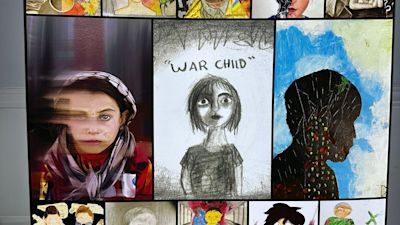Art competition shows the horror of war through the eyes of children

They are images of war through the eyes of children who have lived it and in the minds of those who are fortunate enough to only imagine its impact.
All the pieces are part of “War Through Children’s Eyes”, a competition designed to give children a voice on war and build empathy through creativity.
The competition, open to children in the UK and across the world, was launched by the Azerbaijani diaspora in the UK, to mark the 30th anniversary of the Khojaly massacre that took place on the night of February 26, 1992, in Azerbaijan. 613 civilians, including 106 women and 63 children were killed.
Now, with the world so wracked by conflict, one of the organisers, Narmina Mammadova, is appealing to children around the world to engage and encourage young people to consider the reality of war and the importance of peace.
She believes engaging through art and writing helps children better understand the realities faced by their counterparts in conflict zones and process their own emotions about the state of the world.
“The competition aims to nurture empathy, understanding, and a commitment to peace, all while giving children a platform to express themselves, “Mammadova said.
“I feel that the children of Khojaly, who remained silent amidst the snowy hills, have not had their voices heard, and their deaths seem in vain.
"Through this competition, I want to remind the world that we must give a voice to the children — like those of Khojaly — who have endured unimaginable suffering.
"While I cannot directly help those lost children, I can tell their stories. It is our responsibility to ensure their stories are heard.”
Artwork from previous competitions has now been featured in an exhibition by the artist Arabella Dorman seeking to depict the trauma of war on children in Ukraine.
This competition also helps to raise money for charities such as War Child and Beyond Conflict, in order to continue their work in war zones around the world.
Entries can be submitted until October 18 on their website.
How the competition came to be - Narmina’s story.
The idea for this competition emerged from my own experiences growing up in a country affected by war.
The collapse of the former Soviet Union brought with it a wave of bloodshed and conflicts that swept across many of its former republics, leaving a profound impact on every aspect of life — especially for the innocent children caught in the crossfire.
As a child, I witnessed firsthand the devastating impact that conflict has on people, especially children and women.
However, the memory that has stayed with me the most is the Khojaly massacre, a tragic event in Azerbaijan in 1992.
The horror of that night, which claimed the lives of 613 civilians — including 106 women, 63 children, and 70 elderly people — still haunts me.
The images from newspapers and news reports are etched in my memory. I became friends with a young girl who had become a refugee after losing her home in Agdam, a town near Khojaly, which was called by journalists, 'Hiroshima of the Caucasus' for the level of destruction it received during the war in the 90s.
That girl had to live with her aunt, who was our neighbour in Baku.
I remember her eyes, never laughed, so deep pain that's impossible to describe. Our neighbour's two-bedroom apartment housed seven people, as the family of that girl, who had nowhere else to go, sought shelter there.
The girl was only a year younger than me, and while her situation was difficult, thousands of others weren’t even that fortunate — they lived in tents for years.
The sight of those refugee tents and the pain and despair on the faces of those living in them was a daily reality for me, whether I was on my way to school or shopping. These memories remain with me to this day.
In 2022, on the 30th anniversary of the Khojaly massacre, I had the chance to interview Afsana, one of the survivors.
Her story painted a heartbreaking picture of the suffering her community faced while trying to escape under siege.
The imagery of children and families trapped in the icy forests, falling victim to relentless attacks, deeply moved me.
This encounter inspired me to create a platform that could bridge the gap between children in peaceful countries and those affected by war, fostering empathy and understanding.
I wanted to provide young people in the UK with a way to step into the shoes of their peers in war-torn regions and understand the devastating effects of conflict through their perspectives.
I feel that the children of Khojaly, who remained silent amidst the snowy hills, have not had their voices heard, and their deaths seem in vain.
Subscribe free to our weekly newsletter for exclusive and original coverage from ITV News. Direct to your inbox every Friday morning.
Through this competition, I want to remind the world that we must give a voice to the children — like those of Khojaly — who have endured unimaginable suffering. While I cannot directly help those lost children, I can tell their stories.
By fundraising for charities that support children in war-affected countries, I believe the memory of the children of Khojaly can live on through the good deeds of these organisations.
This competition is dedicated to the memory of the children brutally killed in Khojaly, and to all the children who remain voiceless. It is our responsibility to ensure their stories are heard.
Want a quick and expert briefing on the biggest news stories? Listen to our latest podcasts to find out What You Need To know...